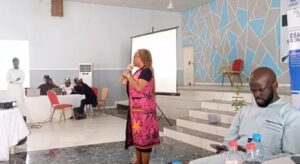 The United Nations Children’s Fund (UNICEF), in collaboration with the Katsina State Ministry of Environment and Ideas and Data Global Academy, recently organized a two-day sensitization workshop aimed at empowering students from secondary schools and higher institutions to address climate change challenges in Katsina State. This initiative is part of UNICEF’s broader Green Rising 9ja movement, which seeks to engage youth in climate action and environmental sustainability efforts.
The United Nations Children’s Fund (UNICEF), in collaboration with the Katsina State Ministry of Environment and Ideas and Data Global Academy, recently organized a two-day sensitization workshop aimed at empowering students from secondary schools and higher institutions to address climate change challenges in Katsina State. This initiative is part of UNICEF’s broader Green Rising 9ja movement, which seeks to engage youth in climate action and environmental sustainability efforts.
Workshop Objectives and Activities
The workshop focused on educating students about the impacts of climate change and equipping them with the knowledge and skills to implement practical solutions within their communities. Key areas of emphasis included:
- Understanding Climate Change: Students were introduced to the causes and effects of climate change, particularly how it affects their local environment and livelihoods.
- Climate-Related Entrepreneurship: The program encouraged students to explore entrepreneurial opportunities in areas such as plastic waste management and sustainable agriculture, promoting the idea of turning environmental challenges into economic opportunities.
- Tree Planting and Nutrition: UNICEF advocated for the planting of fruit-bearing trees in schools, aiming to enhance environmental resilience and improve student nutrition over time.
Implementation Strategy
UNICEF plans to establish climate action clubs in secondary schools across 17 Local Government Areas (LGAs) in Katsina State, including Bakori, Batagarawa, Bindawa, Baure, Charanchi, Danja, Daura, Dutsinma, Dutsi, Funtua, Ingawa, Kafur, Kaita, Kankia, Kurfi, Kusada, and Mai’adua. Each club will consist of approximately 200 students trained to lead climate initiatives and educate their peers.
In higher education institutions, a similar model will be adopted, with 200 students trained to become climate ambassadors. These ambassadors are expected to mobilize and sensitize at least 250 additional students each, creating a ripple effect of climate awareness and action.
Long-Term Goals
The overarching aim of this initiative is to foster a generation of environmentally conscious youths who can drive sustainable practices within their communities. By integrating climate education with practical activities like tree planting and waste management, UNICEF hopes to instill a sense of responsibility and proactive engagement among young people in Katsina State.
This program aligns with UNICEF’s global commitment to empowering youth as key agents of change in the fight against climate change.
Source: EnviroNews
